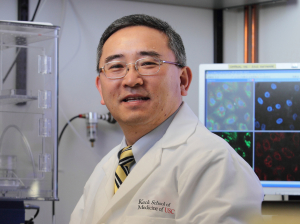
Jae U. Jung, PhD Distinguished Professor Fletcher Jones Foundation Professor Hastings Foundation Professor Chair, Department of Molecular Microbiology and Immunology Director, USC Institute of Emerging Pathogens
Dr. Jae U. Jung is an expert in the molecular biology of cancer-causing herpesviruses and emerging pathogens as they relate to cell biology, biochemistry and immunology. His laboratory is conducting research in host-pathogen standoff, virus-induced malignancy and epigenetic regulation, programmed cell death, emerging pathogens, and immune aging for infection.
What initially attracted you to study infectious diseases?
As a child, I had always been intrigued by the amount of diseases prevalent around the world.
When I was in fourth grade, my elementary school teacher left for maternity leave and was replaced by a substitute teacher who taught science and infectious diseases. It was at this moment that my interest in infectious studies soared and I began memorizing piles of science books detailing infection and biographies of famous microbiologists like Louis Pasteur. The more I studied, the more I became hooked.
Your research involves virus-induced cancer. What influenced your decision to focus in this area?
During my postdoctoral training, HIV studies were in vogue. I completed my fellowship under the guidance of Dr. Ronald Desrosiers over at Harvard Medical School, who had always been interested and passionate about virus-causing cancers, but had steered away from this topic to
What other areas of research are you interested in and why are they important?
Over the past decade, the global health community has been stricken with the occurrences and rapid widespread of novel pathogens; we had the Ebola epidemic in 2014, the MERS outbreak in 2015 and now the emergence of mosquito-born Zika virus in 2016. The rises in incidences and spread of novel pathogens have led to collaborations with other researchers around the world to study the biochemical, immunological and structural significance of emerging and rapid spread of infectious diseases. Globalization of pathogens is a major factor causing profound, sometimes unpredictable, impact on infectious diseases. One patient with a conventional medical problem today can be zero or still one tomorrow. However, one patient with infectious disease today can be zero, one, hundreds or millions tomorrow. So having even a single patient is a major concern in the infectious disease field.
What advice would you give to junior faculty about being competitive in getting grant funding?
The best advice I can give to junior faculty is to be as persistent as a herpesvirus. There is no magic bullet for grant funding. The best outcome results from an accumulation of hard work, persistence, and knowledge from failure. In addition, it is best to be well rounded in all areas of scientific disciplines. Every morning, I allot myself an hour to peruse through five to seven journals to keep up to date with various research topics, as well as technological innovations targeted to advancing science. I firmly believe that chance favors the prepared mind.